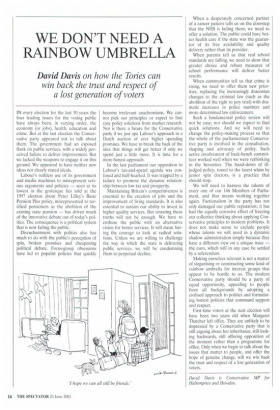WE DON'T NEED A RAINBOW UMBRELLA
David Davis on how the Tories can
win back the trust and respect of a lost generation of voters
IN every election for the last 50 years the four leading issues for the voting public have always been, in varying order, the economy (or jobs), health, education and crime. But at the last election the Conservative party appeared not to talk about them. The government had an exposed flank on public services, with a widely perceived failure to deliver improvement, But we lacked the weapons to engage it on this ground. We appeared to have neither new ideas nor clearly stated ideals.
Labour's ruthless use of its government and media machines to misrepresent serious arguments and policies — seen at its lowest in the grotesque lies told at the 1997 election about Peter Lilley's Basic Pension Plus policy, misrepresented to terrified pensioners as the abolition of the existing state pension — has driven much of the innovative debate out of today's politics. The consequence is a political system that is now failing the public.
Disenchantment with politics also has much to do with the public's perception of spin, broken promises and cheapening political debate. Focus-group obsessions have led to populist policies that quickly become irrelevant anachronisms. We cannot pick our principles or expect to find easy policy solutions from market research. Nor is there a future for the Conservative party if we just ape Labour's approach in a Dutch auction of ever higher spending promises. We have to break the back of the idea that things will get better if only we spend just a little more. It is time for a more honest approach.
In the last parliament our opposition to Labour's tax-and-spend agenda was confused and half-hearted, It was trapped by a failure to promote the dynamic relationship between low tax and prosperity.
Maintaining Britain's competitiveness is essential to the creation of jobs and the improvement of living standards. It is also essential to sustain our ability to invest in higher quality services. But restating these truths will not be enough. We have to enthuse the public with an alternative vision for better services. It will mean having the courage to look at radical solutions. Unless we are willing to challenge the way in which the state is delivering public services, we will be condemning them to perpetual decline. When a desperately concerned partner of a cancer patient tells us on the doorstep that the NHS is failing them, we need to offer a solution. The public could have better health care if the state was the guarantor of its free availability and quality delivery rather than its provider.
When parents tell us that real school standards are falling, we need to show that greater choice and robust measures of school performance will deliver better results.
When communities tell us that crime is rising, we need to offer them new priorities, replacing the increasingly draconian changes to the criminal law (such as the abolition of the right to jury trial) with dramatic increases in police numbers and more determined law enforcement.
Such a fundamental policy review will not be easy; nor should we expect to find quick solutions. And we will need to change the policy-making process so that the whole of the parliamentary Conservative party is involved in the consultation, shaping and advocacy of policy. Such active involvement of back-bench committees worked well when we were rethinking in the Seventies. The hand-down of illjudged policy, tuned to the latest whim by junior spin doctors, is a practice that should stop.
We will need to harness the talents of every one of our 166 Members of Parliament, and that means working together again. Factionalism in the party has not only damaged our public reputation; it has had the equally corrosive effect of freezing our collective thinking about applying Conservative principles to modern problems. It does not make sense to exclude people whose talents we will need in a dynamic shadow administration simply because they have a different view on a unique issue — the euro, which will in any case be settled by a referendum.
Making ourselves relevant is not a matter of sloganising or constructing some kind of rainbow umbrella for interest groups that appear to be hostile to us. The modern Conservative party should be a party of equal opportunity, appealing to people from all backgrounds by adopting a civilised approach to politics and formulating honest policies that command support and respect.
First-time voters at the next election will have been two years old when Margaret Thatcher left office. They are unlikely to be impressed by a Conservative party that is still arguing about her inheritance, still looking backwards, still offering opposition of the moment rather than a programme for office. Only when we begin to talk about the issues that matter to people, and offer the hope of genuine change, will we win back the trust and respect of a lost generation of voters.
David Davis is Conservative MP for Haltemprice and Howden.


































































 Previous page
Previous page